| Reviews & Columns |
|
Reviews DVD TV on DVD Blu-ray 4K UHD International DVDs In Theaters Reviews by Studio Video Games Features Collector Series DVDs Easter Egg Database Interviews DVD Talk Radio Feature Articles Columns Anime Talk DVD Savant Horror DVDs The M.O.D. Squad Art House HD Talk Silent DVD
|
DVD Talk Forum |
|
|
| Resources |
|
DVD Price Search Customer Service #'s RCE Info Links |
|
Columns
|
|
|
Catherine Deneuve 5-Film Collection
THE MOVIES:
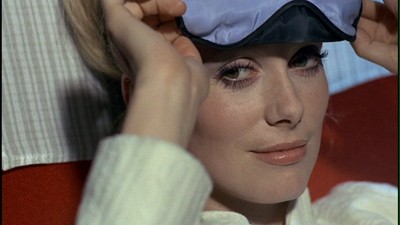
Catherine Deneuve was one of the most interesting and iconic French actresses to emerge in the 1960s. Her fragile, porcelain beauty and bright blonde hair made her both alluring and somehow untouchable. For as close as a man could get, she would always be just out of reach. The parts she played often reflected this quality, and she also had a real knack for playing disaffected women. In movies like Belle du jour, you couldn't know her because she didn't really know herself.
Though Deneuve made classic and adventurous films with directors like Bunuel, Truffaut, and Demy, the movies in the three-disc Catherine Deneuve 5-Film Collection are none of those; nor are they representative of the films she made in the 1990s with filmmakers like Francois Ozon and Lars Von Trier. Spanning 1968 to 1984, these movies represent the middle shelf of the Catherine Deneuve filmography. Though the cover copy declares that these are five "classic films," most of them are anything but, and even the better films (Manon 70, Hotel des Ameriques) barely scrape the classification with the very tips of their fingers.
There is also little rhyme or reason to why these films have been grouped together outside of the fact that Lions Gate owns the rights to all of them. The subjects range from an experimental updating of an old story to action to romantic comedy and melodrama. Your interest in this set is likely going to depend on how much you like Catherine Deneuve, and even if you're fan the way I am, you're going to be resentful how some of these flicks do her so few favors. She's good in all of them, struggling with all of her acting strength against inferior material, but alas, she's not always strong enough.
***DISC 1 ***
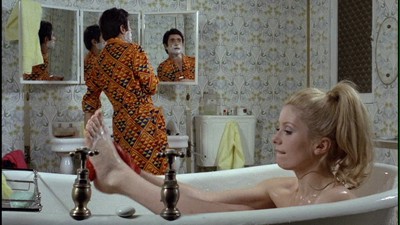
* Manon 70 (105 minutes - 1968 - 3 1/2 stars): Deneuve plays Manon, an alluring woman who turns heads wherever she goes. When international reporter Francois (Sami Frey, Who Are You, Polly Magoo?) spots her in an airport in China, he immediately upgrades his ticket to first class to be in the same section as her. Once they land in Paris, he makes his move and steals her from the man she's been traveling with. It's love at first sight for this pair, but a sort of twisted love of possession and denial. Francois is a man who believes fidelity is purely physical, whereas Manon believes that for women the body means little, it's love that counts. Manon is used to jumping from one rich man to the next, pimped out by her brother (Jean-Claude Brialy, A Woman is a Woman), who isn't keen on seeing his meal ticket compromised. The siblings try to get Francois on board, and through two side relationships, he fights against the norm, at the cost of his career and at times his dignity. All these men wish to have Manon, but Francois is the only one who won't share.
Based on an 18th-century novel by Abbe Prevost, Manon 70 attempts to take the courtly drama of the original and transfer it to modern day. Written and directed by Jean Aurel (Les Femmes), the film can never quite make sense of its own anachronisms. It has the coldness and repression of a costume drama, but without the costumes, and the skimpy fashion of the flower-power generation ends up being a bigger tease than Manon herself. There's a lot of sex, but no passion; a lot of flirtation, but no pay-off. Perhaps the film's problem is best described by its music. The classical pieces by Vivaldi and Seixas are austere, yet overbearing and distancing, whereas the modern nightclub music composed by Serge Gainsbourg is comically dated, sounding like what someone who has barely heard rock 'n' roll would come up with when trying to approximate what the kids are listening to.
Still, Manon 70 isn't completely unwatchable. Its queer, chilly tone actually makes for an odd curiosity, a picture that looks like it's celebrating the sexual liberation of the 1960s when its actually suggesting that free love doesn't work. Manon may think she's progressive, but not everyone would agree. As a vehicle for Deneuve, the movie is perfectly suited to her talents. Her performance manages to capture the schism Aurel is struggling for, as the actress can go from seeming worldly and fully aware of her seductive powers to entirely innocent, almost like there is a switch she can flip, from knowing woman to coquette and back again. If Aurel's intention was to capture the actress' luminescence, then mission accomplished. All by herself, she makes the men of Manon 70 appear sympathetic, because watching her makes it easy to understand what they are getting all worked up about.
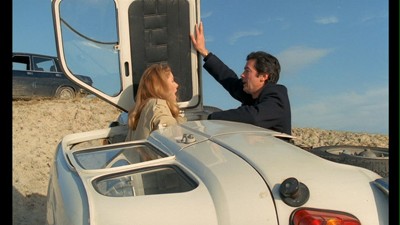
* Le Choc (98 min. - 1982 - 2 stars): Some movies reek of the timeframe they were made in, and Le Choc has the tepid stink of the 1980s all over it. From the clunky swoosh behind the title logo through the faux-funk sax-driven score and the flat, airless cinematography, you could identify it as an '80s B-movie at barely a glance. This low-rent vehicle for French tough guy Alain Delon (a long way from his Le Samourai days) could have just as easily served any of the generic Hollywood action stars of the decade. Jeff Speakman, where are you?
Delon stars as Christian, the best hitman in Paris. Like so many hitman before him, though, he has had enough and its time to get out. Only, his boss (Francois Perrot) doesn't want to lose his most valuable weapon, forcing Christian to get out of Paris. First stop: the turkey farm his kooky financial planner (Stephane Audran) bought for him. There, he meets the farmer's wife Claire (Deneuve), falls in love with her, has sex with her on a fur rug (not joking), dodges some terrorists with a score to settle, and then runs back to Paris with Claire to settle his own score.
It's all fairly run-of-the-mill stuff, with little to distinguish it or make it worth taking the time. Delon has his cold-hearted killer routine down, but the performance is severely undercut by the clumsy action sequence and bad blood-and-gore effects. (Rubber knife penetrates rubber skull! That's not a special effect, it's physics!) Deneuve makes the most of the troubled woman role, but she looks sad most of the time, like having to be a part of the production depresses her. Developed by Delon with director Robin Davis, Le Choc may have been designed to give the aging star a chance to put some money in the bank, but like his character discovers at the second act break of the movie, the vault is bone dry.
Video for DVD 1: Manon 70 is presented at 1.78:1 aspect ratio, and the picture quality is mostly good. The '60s pastels look rather nice, though at times maybe a little under their intended hue. The resolution is adequate, and the image surface mainly clean.
I only saw one or two spots on the transfer of Le Choc, and it looks like it had a better source master than Manon 70. The 1.66:1 transfer runs a little hot, however, and in scenes where Delon is in his apartment, where the central color is orange, or other places where the color scheme is more summery, the picture starts to glow and suffers from ghosting problems. The more natural environments look better, and the actual movie production looks cheap in general, so it may just be the nature of how the movie was shot.
The coupling of these two movies on one DVD strikes me as pretty haphazard. They are neither thematically linked nor of the same time period. If they were separate releases, I'd probably keep Manon 70, but Le Choc would go right into the used bin.
***DISC 2 ***
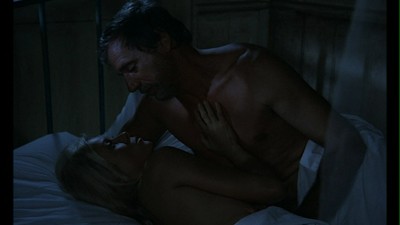
* Le Sauvage (103 min. - 1975 - 2 1/2 stars): This 1975 romantic comedy stars Deneuve as Nelly, a natural disaster of a woman who destroys everything in her path. Living in Venezuela, she becomes engaged to a boorish Italian (Luigi Vannucchi) and leaves him on the eve of her wedding. Unable to collect the money owed her by a former boss (Tony Roberts, Stardust Memories) so she can fly back to Paris, she steals an expensive painting and then tricks the kind-hearted Martin (Yves Montand, Jean de Florette) into helping her out. Chased by the two lunatics she's wronged, Martin does some solid defensive driving before putting Nelly on a plane out of the country. Or so he thinks! When Martin sails out to the remote island he calls home, he finds Nelly waiting for him. She ruins several more things in his life, vexes him, and then steals his heart--only for him to ruin everything the way men often do after sex, making life tense for the two castaways. Turns out that Martin has some people on his trail himself, and so these two new lovers will see things get even more complicated before they get better.
Director Jean-Paul Rappeneau (The Horseman on the Roof) is aiming for a screwball comedy here, and though he's got the pacing right, the script lacks any of the wit of the great madcap love fests he wishes to evoke. The car chases and slapstick are directed with a leaden hand, and the movie seems to be sputtering around in search of itself before it finally lands on Martin's tropical island. The romance finally picks up a bit once Deneuve and Montand are alone, as the pair has good chemistry together. Nelly is exasperating to deal with, and you really do feel for the guy when she's on one of her terrors; at the same time, his reactions are spot-on and thus the tender moments that eventually do occur come off as believable.
Unfortunately, the added subplot of Martin's past life is completely unnecessary, and the way it and Nelly's past misdeeds ultimately intrude on the story takes us right back down into mundane schtick and mawkish romanticism. Had Deneuve and Montand had a consistent script, Rappeneau could have really had something, but as one of the co-writers on the screenplay, he probably only has himself to blame for the whole affair falling apart.
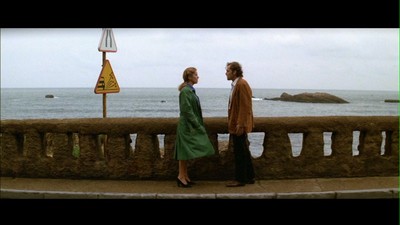
* Hotel des Ameriques (95 min. - 1981 - 3 stars ): I will say this about Catherine Deneuve's work in the 1980s, she becomes a more accessible actress. Despite losing none of her beauty with age, she does acquire an earthy warmth that makes her seem more real, even though her face is still iconic.
This time around, Deneuve plays Helene, a troubled woman grieving for her dead lover. He was an architect who left her alone in a coastal tourist trap with a giant house she can't afford to fix up and can't bear to part with. One night she literally runs into Gilles (Patrick Dewaere, Beau Pere) with her car, beginning a strange romance. The guarded Helene eventually lets him in, but pretty soon he takes on her obsessions, and she finds herself right back in her same old patterns.
Deneuve brings a fragility and a pervasive sadness to her portrayal of Helene. The performance has a lot of depth and the actress appears to carry with her a rich inner life. Dewaere, on the other hand, is a bit of an enigma, and his character's motivations become muddier as the picture progresses. Co-written and directed by Andre Techine, Hotel des Ameriques is intended to be a serious melodrama about unhealthy relationships and transitory human emotions, as symbolized in the tourist town and the hotel run by Gilles' family. People come and go. For the most part, it succeeds in establishing these relationships, but I suppose like the relationships themselves, fizzles and wears out its welcome in the end.
Video for DVD 2: Le Sauvage is shown at a 1.66:1 aspect ratio, and the picture is really good. Nice colors, no sign of wear, just a little grain in some later scenes that appears to be just the way those scenes were shot. An entirely solid presentation.
Hotel des Ameriques has a similar look as Le Choc. The very wide 2.35:1 aspect ratio image has generally good colors, but the brighter they get, the heat goes off the charts and the resolutions suffers.
***DISC 3 ***
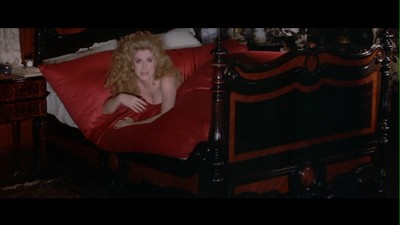
* Fort Saganne (180 min. [erroneously listed as 103 minutes on the packaging] - 1984 - 2 1/2 stars): In this mammoth effort by director Alain Corneau (All the Mornings in the World), Gerard Depardieu plays Charles Saganne, a soldier serving in the French Foreign Legion managing France's colonial interests in the Sahara desert in 1911. Coming from a lower-class background, Saganne hopes to prove himself enough to become a respected officer, buy the largest house in his hometown, and win the right to marry a beautiful rich girl (Sophie Marceau). The desert proves a harsh battleground, however, particularly as the home office in France is starting to become more concerned about Germany. The tougher things get, though, the harder Saganne is willing to fight.
Since this box set is called the Catherine Deneuve 5-Film Collection, it strikes me as ridiculous that the studio would include a movie that has so little of her in it. The actress doesn't even show up until halfway through the movie, after an intermission, and then she's only onscreen for less than twenty minutes. Deneuve plays Louise, a French journalist who taunts Saganne in print in order to bed him, falls in love with him, and then drops him after he inadvertently causes a family tragedy. Her character doesn't appear again until the end of the movie, when WWI has broken out. Louise has become a nurse, and she sees Charles again for about two minutes. She's not even the character he has been pining for the entire picture, that's Marceau, so her return is pointless.
The movie is fine for what it is, I suppose. It moves agonizingly slow at times, and is as dry as the desert Saganne travels. Depardieu delivers a quiet, understated performance, and as a thinking actor, he is able to make the battles--which have more tactical maneuvers than they do actual fighting--seem interesting. Overall, though, Fort Saganne is far longer than it needs to be and far too simple minded to be so ponderous.
Video for DVD 3: Another widescreen 2.35:1 aspect ratio. Fort Saganne is the best looking of all the movies, with very little by way of resolution issues or problems with oversaturated colors. Which is good, since the fact that it's in the desert means the movie is bright most of the time.
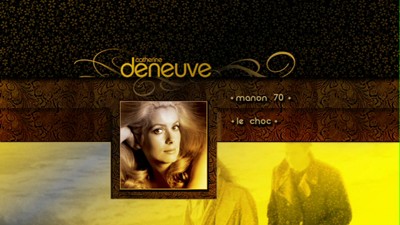
THE DVD
Sound:
All of these movies have the same audio specs: mono mixes with English and Spanish subtitles. The English translation is of typical quality, with a couple of obvious typos in a few of the movies. The sound overall is sharp, without too much distortion or metallic sounding tones. I would rate the overall audio as average. The main language of all the films is French, though some of them, most obviously Le Sauvage, are multilingual.
Extras:
No extras at all, not even trailers.
The three-DVD set comes in a cardboard book with two plastic trays, one with a DVD on each side and the other holding just one disc. The book has photos printed on it, and the approved "poster" credits for each movie. The book is wrapped in a puffy vinyl slipcover that has more about each film on the back, including cameo images and very short plot summaries.
Though each double-set shares a main menu on their DVDs, the individual films also get their own menus with chapter selection, etc.
FINAL THOUGHTS:
Rent It. If I'm going to get a boxed set called the Catherine Deneuve 5-Film Collection, I don't want two films that are little more than starring roles for their male leads, I want films that give Catherine Deneuve equal billing. I also want them to be good. There are more hits than misses here, with only one solidly interesting film. Manon 70 is a well-meaning experiment in bringing an 18th-century novel into the late 1960s, full of colors and ideas. Even if its not entirely successful, your memory of it will only improve as you slog your way through the rest of the set. Most of the films hover around average rather than being full-out bad, but even fans of the luminous actress will have a hard time justifying shelling out the cash for such a poor showing. The star is always good, the material is not.
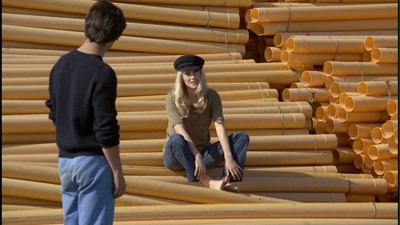
Jamie S. Rich is a novelist and comic book writer. He is best known for his collaborations with Joelle Jones, including the hardboiled crime comic book You Have Killed Me, the challenging romance 12 Reasons Why I Love Her, and the 2007 prose novel Have You Seen the Horizon Lately?, for which Jones did the cover. All three were published by Oni Press. His most recent projects include the futuristic romance A Boy and a Girl with Natalie Nourigat; Archer Coe and the Thousand Natural Shocks, a loopy crime tale drawn by Dan Christensen; and the horror miniseries Madame Frankenstein, a collaboration with Megan Levens. Follow Rich's blog at Confessions123.com.
|
| Popular Reviews |
| Sponsored Links |
|
|
| Sponsored Links |
|
|
| Release List | Reviews | Shop | Newsletter | Forum | DVD Giveaways | Blu-Ray | Advertise |
|
Copyright 2024 DVDTalk.com All Rights Reserved. Legal Info, Privacy Policy, Terms of Use,
Manage Preferences,
Your Privacy Choices | |||||||













